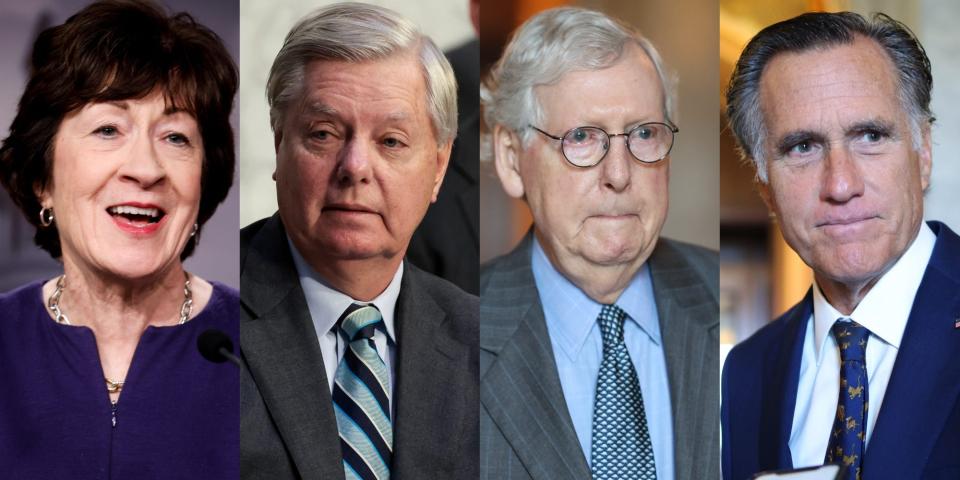The GOP is in the midst of an intra-party showdown over a nearly $1.7 trillion government funding bill.
Kevin McCarthy even vowed to block House consideration of bills sponsored by GOP senators who voted for it.
But a slew of GOP senators voted for it anyway, including 4 who are retiring and 14 who will remain.
The Senate on Thursday passed a nearly $1.7 trillion "omnibus" spending bill to fund the government through most of next year, with 18 Republican senators joining all Democrats in sending the bill to the House, where it's expected to pass on Friday.
It came amid a showdown among Republicans over the sweeping legislation, which also includes reforms to the Electoral Count Act designed, among other things, to ensure that a vice president cannot unilaterally decide a presidential election. It also contains tens of billions of dollars in new funding for Ukraine.
Conservatives, particularly in the House of Representatives, had opposed the bill over the breadth of the spending. They also bemoaned the fact that the bill will deny House Republicans a key point of leverage in forcing President Joe Biden's administration's to bend to their will, lest they refuse to fund the government. Former President Donald Trump also voiced his opposition to the bill in a video on Truth Social on Thursday.
The rhetoric escalated even further earlier this week, with current House Minority Leader Kevin McCarthy — who's still trying to secure enough Republican votes to become Speaker of the House next year — pledging to block any bills sponsored by Republican senators who voted for the bill.
In the Senate, McCarthy's threat was largely met with a shrug.
"Kevin's in a tough spot," Republican Sen. Kevin Cramer of North Dakota, a former House Republican and an opponent of the omnibus himself, told CNN's Manu Raju. "Statements like that... is the very reason that some Senate Republicans feel they probably should spare them from the burden of having to govern."
Additionally, four Republican senators who voted for the bill are retiring, making the threat meaningless to them.
Senate Minority Leader Mitch McConnell, who voted for the bill, argued ahead of its passage that it represented a conservative victory.
Whether McCarthy is able to keep his promise — the 14 returning senators who voted for the omnibus also include conservative lawmakers like Lindsey Graham and John Cornyn — remains to be seen.
Furthermore, the Senate will remain in Democratic hands for the next two years, dimming the chances that any Senate legislation that McCarthy and House Republicans would be inclined to support will make it to their side of the Rotunda anyway.
Here are the 14 Republican senators who voted for the bill and are remaining in office:
Mitch McConnell of Kentucky
Susan Collins of Maine
Mitt Romney of Utah
Lindsey Graham of South Carolina
Lisa Murkowski of Alaska
John Cornyn of Texas
John Thune of South Dakota
Tom Cotton of Arkansas
Todd Young of Indiana
Shelley Moore Capito of West Virginia
John Boozman of Arkansas
Jerry Moran of Kansas
Mike Rounds of South Dakota
Roger Wicker of Mississippi
And here are the four who voted for it and are retiring:
Roy Blunt of Missouri
Jim Inhofe of Oklahoma
Rob Portman of Ohio
Richard Shelby of Alabama


No comments:
Post a Comment